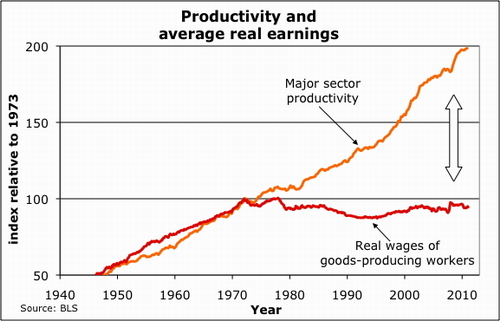
We've heard a lot about loss of labor rights in Wisconsin, and so-called "Right to Work" legislation in Indiana, and now Michigan. We get the impression that laws in those states had somehow required workers to join unions.
Quite the contrary. Unions, are the bargaining agent for the employees, negotiating contracts with employers -- binding legal contracts, sacred to conservative think tanks everywhere.
To do that, unions survey their members, prioritize their issues, and negotiate collectively to settle the terms and conditions of employment. When workers want the strength that comes from members paying dues and non-members paying an "agency fee," their union -- their bargaining agent -- negotiates for that.
Laws don't give agency fee to a union. If union members want it, their union negotiates for it. Most unions struggle for decades to achieve this level of workplace strength.
Every time members approve a contract, they approve its terms and conditions, which may include medical and dental benefits, pension and 401(k) plans, layoff and recall, vacation and holidays, work schedules, and sometimes agency fee.
I can't think of a labor contract that everyone loved 100 percent. Many voting union members will dislike certain terms in the medical plan, and almost everyone wants some kind of language that never made it into the final package. In general, an imperfect offer is presented to the members, who then vote.
That's collective bargaining and democracy in action. Democracy is rarely elegant, to say the least.
Collective bargaining is one place where workers have voice at work. In fact, our union is the only democratic institution most of us will ever see at work.
Let's be clear. Democracy does not normally extend inside the workplace.
Most employers have near-total authority over employees regarding hiring, firing, transferring and assigning work to employees. The Bill of Rights does not apply to workplace activity. An employer can insist -- as a condition of employment -- that all workers listen to anti-union speeches. The employer can search your belongings, tap your phone, read your email, tell you when and where you can eat, prohibit you from smoking and tell you what you can and can't read on the Internet.
State and Federal laws protect certain civil rights for military veterans, women, older workers and certain minorities. Otherwise, work-related issues are protected in a union contract or not at all.
As it happened, my union won agency fee in a strike. OK, That's not true. My union won the opportunity to vote on agency fee in a strike. Well, really, we won the right for all represented employees -- members and non-members -- to vote on agency fee. That was our choice.
At the time, we had about 60 percent membership, although participation in the strike was well above that. The "yes" vote for agency fee was about 15-20 percent above the membership percentage at the time. Many non-member voters said they would happily join and pay dues, if everyone paid.
That was the democratic collective decision of our members. And non-members.
We all know that those politicians who would gladly vote for "right to work" in Indiana, Wisconsin and Michigan don't really care about workers' rights. Right to Work takes away the workers democratic right to decide what terms they want to negotiate into their contract.
If those politicians really cared about workers rights, they'd enforce workers' right to organize without being intimidated or fired. They would respect every worker's right to decline a meeting for anti-union propaganda, and the right to increase their union's strength.
State governments in Wisconsin, and Michigan showed contempt for the democratic process, ramming through legislation using tactics that would be unheard of for any other policy issue. Democracy lost twice -- once in the state capitol, and again in the workplace.
When we step back and look at this, it's really about money and political power.
Democracy is already wilting under campaign finance rules that drive candidates to take positions that please millionaire donors.
We defend democracy through a strong civil society. Let's think, what institutions of civil society can provide that counterbalance? My list: churches, free press and other media, environmental groups, social justice organizations, advocacy groups... and unions. Unions are organized in every state, and most congressional districts.
Legendary campaign strategist Karl Rove teaches us to attack your opponent's strength. First, attack public employees and teachers, where union density is highest. Then attack stronghold states, like Michigan and Wisconsin. If unions fade as a campaign force, then the counterbalance of civil society shrinks.
I remember a time when the purpose of public policy was to raise my standard of living. I was taught that was the measure of good policy and good economics.
We can see a simple test of that in the figure below. For decades, workers shared gains as productivity increased. That was the result of good public policy and a strong civil society, among other things. For the last three or four decades, those gains eluded most workers, going instead to the few at the top. If workers had continued sharing gains since the 70s, earnings would be twice what they are now.

Michigan's Governor said he could not let Indiana get ahead of Michigan in the race to the bottom. He told us that in the zero-sum game of state policies, we will all do better when we all do worse. I don't think that makes sense in Michigan or anywhere else.
